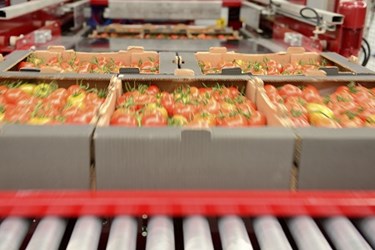Don't Be The Weakest Link: Improving The Food Industry's Supply Chain

By Sam Lewis

The food industry’s supply chain is a difficult landscape to traverse. New technologies seem to arrive on a monthly basis, logistics always presents its own unique challenges, consumers are becoming increasingly demanding, and food safety legislation is constantly evolving — it’s a lot for food manufacturers to stay on top of. Here, Daniel Triot, Senior Director of the Trading Partner Alliance of the Food Marketing Institute (FMI) and Grocery Manufacturers Association (GMA), answers my questions about supply chain obstacles food manufacturers and retailers are facing and offers guidance on how to overcome them.
Food Online: Currently, consumer food preferences are trending toward fresh produce. What are some best practices food processors can implement in their cold chains to ensure consumers receive fresh, safe products while maximizing profit margins?
 Triot: Food processors need to understand that consumers are looking for “local,” which means the processors ability to connect with local retailers can vastly improve the time it takes to get produce from field to shelf. With produce, that amount of time between field and shelf is critical to the quality of the product. Creating local supply chain opportunities is one way of bringing higher quality produce to consumers.
Triot: Food processors need to understand that consumers are looking for “local,” which means the processors ability to connect with local retailers can vastly improve the time it takes to get produce from field to shelf. With produce, that amount of time between field and shelf is critical to the quality of the product. Creating local supply chain opportunities is one way of bringing higher quality produce to consumers.
Another opportunity is to make sure cold chain is in place at all stops between the field and the shelf. Having conversations with retailers on how important cold chain is once the product is delivered is key to maintaining quality produce. Also, giving retailers data that will share the value of keeping the cold chain helps them monetize the opportunity.
Finally, companies should make sure they are certified for food safety and assuring they are in compliance with FSMA’s Produce Safety Rules will be critical.
Food Online: How is FSMA affecting the food industry’s supply chain? What can food manufacturers and food retailers do to help each other overcome those challenges?
Triot: The future is now! FSMA is the most significant food safety regulation of our professional lifetime. This new approach to food safety will affect every food company. FSMA’s Preventive Controls for Human Food rule is now final, and compliance dates for some businesses begin as early as September 2016. Fundamentally, the FDA’s Preventive Controls final rule revises food safety regulations in two ways:
First, it adds new preventive controls provisions as required by FSMA. Second, it updates and revises certain requirements in the existing current good manufacturing practice. Key steps in preparation for FSMA include becoming educated on the requirements of the final rule for Preventive Controls for Human Food, especially the detailed and extensive recordkeeping requirements that involve numerous entities within the supply chain.
In addition, companies should conduct a gap analysis of their current food safety system in comparison to the FSMA final rule, train employees for it, and implement good recordkeeping practices.
Food Online: How can food manufacturers enhance operational efficiency in their supply chains?
Triot: Operational efficiency certainly needs to be a key strategic focus for food manufacturers throughout the supply chain to better meet their customers’ needs and grow their business.
This can be achieved in a number of functional areas, from product design, all the way to omni-channel distribution and the product shelf:
- Collaborative planning between trading partners can improve On Shelf Availability (OSA) and presents the opportunity to improve supply chain efficiency as Out-Of-Stock rates remain at a stubborn 8 percent despite many years of good faith efforts by manufacturers and retailers.
- Data quality is another critical area to every organization. Data needs to be optimized not only internally, but it must also be timely and accurately shared with trading partners to allow faster movement of product throughout the entire supply chain.
- Transportation also presents unique challenges, as driver shortages and chronic capacity squeezes to improve delivery times, inventory management, and service levels.
Food Online: What measures can food manufacturers implement to assess those improvements?
Triot: Ongoing alignment between trading partners to meet their consumers’ expectations in an omni-channel world is one of the first steps to identifying gaps and developing solutions to improve efficiency. Metrics and data, process and practice, organization’s design and culture, as well as technology are key areas that manufacturers should focus on to assess areas of opportunity to improve their supply chain efficiency when, at the same time, better meet their customers’ needs.
Food Online: Where can food manufacturers get more information and education on creating, implementing, and upholding best practices for the supply chain?
Triot: Both FMI and GMA have a number of education tools available to companies throughout the year, such as white papers, industry surveys, or webinars.
Each year, the FMI-GMA Trading Partner Alliance Supply Chain conference is an excellent venue for retailers, manufacturers, and service providers to gain the latest insight from industry experts and network with their peers. This year’s conference will be no exception, with five tracks of solution-driven case studies in such hot industry topics as Fresh, Product Life Cycle, Regulatory, Supply Chain Optimization, and Transportation.
The conference will take place in New Orleans Feb 22-24. Go to www.tpasupplychain.com to get more information and register.
About Daniel Triot
Daniel Triot is currently the Trading Partner Alliance (TPA) Senior Director, a new-shared role between the Food Marketing Institute (FMI) and the Grocery Manufacturers Association (GMA) to further solidify the TPA joint approach to common retailer-manufacturer issues.
Prior to joining the TPA, Daniel was Founder and President of DHT Consulting, LLC, a strategic advising firm that envisions breakthrough solutions. Daniel is a senior executive with more than 30 years of multi-functional and global experience with Arc International, The Gillette Company and Procter & Gamble. His areas of expertise include transatlantic business development, strategic planning, global multi-functional process improvements, M&A integration and reverse logistics.
At P&G, Daniel was most recently the Corporate Customer Logistics Programs Owner. He led the Multi GBU DSD Program and managed the corporate Unsaleables Program and Product Recalls for which he redesigned the process and streamlined customer notifications through Rapid
Recall Exchange. He played an industry pivotal role on GMA/FMI Joint Industry Unsaleables Leadership Team and GS1 Global Recall Standards working group.
During his 24 year tenure at P&G/Gillette, Daniel held positions of increased responsibilities in
Business Development, Market Strategy and Planning, as well as Operations Management for major brands in Personal Health, Grooming, Batteries, Household Needs, and Stationery Products.
Prior to joining Gillette, Daniel was National Sales Manager at Arc International where he successfully opened entry of its glass and housewares special markets division into the U.S.
In his first international assignment, Daniel was Deputy Trade Attaché at the French Embassy in
Trinidad, WI. He assisted French exporters negotiating manufacturing tenders and distribution networks with governments and companies in 12 Caribbean and South American countries.
Daniel holds an advanced degree in Business Administration from Ecole Supérieure de Commerce in France.
